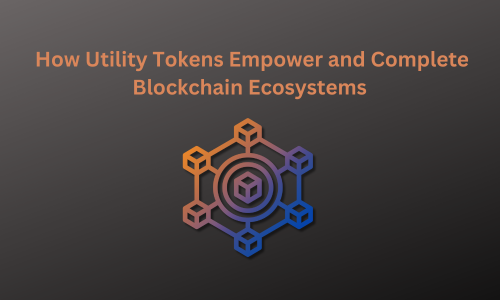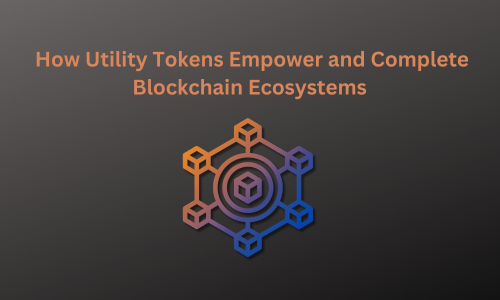


In the rapidly evolving world of blockchain technology, utility tokens have emerged as crucial elements that not only complement but also complete the ecosystems of decentralized platforms. These tokens are more than just digital assets; they are the fuel that drives the internal economy, incentivizes user participation, and secures the platform. In this article, we explore why utility tokens are essential for the success of a company’s decentralized blockchain platform and how they transform the ecosystem into a vibrant, self-sustaining network.
At its core, a decentralized blockchain platform is a distributed network where data and processes are managed by a community rather than a central authority. This structure ensures enhanced security, transparency, and autonomy for users. Whether the platform is designed for decentralized finance (DeFi), supply chain management, or digital identity, its decentralized nature offers significant advantages over traditional centralized systems.
However, to fully realize the potential of decentralization, these platforms need a way to engage users, encourage contributions, and ensure the smooth operation of services. This is where utility tokens come into play.
A utility token is a type of digital asset that grants holders access to specific services or features within a blockchain-based ecosystem. Unlike cryptocurrencies like Bitcoin, which primarily serve as a store of value or medium of exchange, utility tokens are designed to be used within a particular platform. For example, ETH (Ethereum) is used to pay for transactions on the Ethereum network, while BNB (Binance Coin) provides discounts on trading fees within the Binance ecosystem.
Utility tokens are the lifeblood of a decentralized platform, providing several key functions that help maintain and expand the ecosystem:
Utility tokens incentivize users to actively participate in the platform. Whether it’s contributing computing power, creating content, or engaging in governance, tokens reward users for their contributions. This not only drives participation but also fosters a vibrant community.
Utility tokens often serve as the gateway to accessing the platform’s services. Whether it's using a decentralized application (dApp), participating in a governance vote, or staking tokens to earn rewards, these tokens are essential for unlocking the platform's full potential.
In many blockchain platforms, utility tokens are used to pay for transactions. For instance, users might need to spend tokens to execute smart contracts, send data across the network, or interact with dApps. This creates an internal economy where tokens circulate and generate value within the ecosystem.
Utility tokens play a crucial role in creating and sustaining economic value within the ecosystem. This is achieved through several mechanisms:
As users and developers engage with the platform, the demand for utility tokens increases, potentially driving up their value. Tokens can be traded on exchanges, adding liquidity and providing users with opportunities to realize gains.
Tokenomics refers to the economic model governing the utility token, including aspects like token supply, distribution, and incentives. A well-designed tokenomics strategy ensures that the token remains valuable and scarce, encouraging users to hold and use the token rather than merely speculate on its price.
Utility tokens provide a direct incentive for developers to build and innovate on the platform. By rewarding developers with tokens, the platform ensures a continuous influx of new features, services, and improvements, which in turn attract more users.
Utility tokens are also integral to the security and governance of decentralized platforms:
In many platforms, tokens are used in staking mechanisms where users lock up their tokens to participate in network validation or consensus processes. This not only secures the network but also aligns the interests of users with the platform’s success.
Decentralized governance is another critical aspect where utility tokens play a pivotal role. Token holders often have the right to vote on platform upgrades, protocol changes, or other significant decisions. This democratic approach ensures that the platform evolves in a way that reflects the collective interests of its community.
Utility tokens serve as the glue that binds various components of a decentralized platform into a cohesive and functional ecosystem:
Utility tokens facilitate seamless interaction between different parts of the platform. Whether it's enabling transactions between users, integrating with other decentralized applications, or exchanging value across different blockchain networks, these tokens ensure interoperability and connectivity within the ecosystem.
By integrating various services, products, and user activities, utility tokens create a unified ecosystem. For example, a token might be used across multiple dApps within the platform, allowing users to switch between services without needing to exchange currencies or deal with external fees.
Utility tokens also support the long-term scalability and sustainability of the platform. As the ecosystem grows, the value of the token can increase, providing ongoing funding for development and incentivizing user retention.
To illustrate the power of utility tokens, consider platforms like Ethereum and Binance. On Ethereum, the ETH token is used to pay for gas fees, incentivizing developers to create dApps that drive the platform’s growth. Similarly, Binance’s BNB token started as a way to reduce trading fees but has since evolved into a multi-purpose token used across the entire Binance ecosystem, from trading to staking and governance.
While utility tokens offer immense benefits, they also come with challenges:
The regulatory landscape for utility tokens is complex and varies by jurisdiction. Companies must navigate these challenges carefully to ensure compliance while still delivering value to users.
Adoption can be hindered by factors such as user education, technological complexity, and market competition. Overcoming these barriers requires a concerted effort to simplify the user experience and demonstrate the token’s value proposition.
Utility tokens are more than just a component of a decentralized blockchain platform—they are the catalyst that drives the platform's growth, security, and innovation. By incentivizing participation, enabling access to services, and securing the network, utility tokens complete the ecosystem, transforming it into a vibrant, self-sustaining entity.
As blockchain technology continues to evolve, the importance of utility tokens will only grow, making them an indispensable part of any decentralized platform’s strategy. If you're intrigued by the potential of utility tokens, now is the time to explore the platforms that use them and consider how you might participate in these exciting ecosystems.
Additional Resources
For those interested in diving deeper, check out the platform’s whitepaper, join community forums, or explore decentralized applications built on the network. The world of utility tokens is vast and full of opportunities—don’t miss out on the chance to be part of the next wave of blockchain innovation.
Disclaimer: This article is provided for informational purposes only. It is not offered or intended to be used as legal, tax, investment, financial, or other advice.
